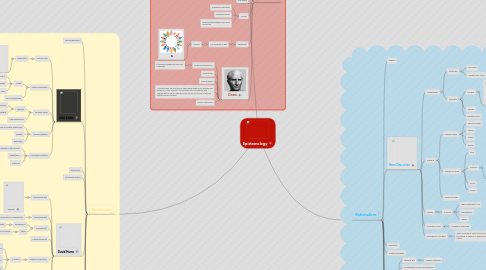
1. Skepticism
1.1. Greek for "to inquire"
1.2. Uncertain
1.3. St. Agustine
1.3.1. Free will
1.3.1.1. .
1.3.2. Humans are morally responsible for their actions
1.3.3. "Restrict your ascent to mere fact of your
1.3.4. Subjective view of time
1.3.5. Original sin
1.3.5.1. .
1.3.6. Doctrines of predestination
1.3.7. Efficacious grace
1.4. Not denial
1.5. Modes
1.5.1. Subjective perceiver
1.5.2. Objective world
1.5.3. Relationship between perceiver and world
1.6. Relativism
1.6.1. No universal truths
1.6.1.1. Culture
1.6.1.1.1. .
1.7. Cicero
1.7.1. Academic skepticism
1.7.1.1. Distinguish cognitive from non cognitive
1.7.2. Natural law
1.7.3. Natural rights
1.7.4. “Socrates was the first to call philosophy down from heaven and set her in cities and even to bring her into households and compel her to inquire about human life and customs as well as matters good and evil.”
1.7.5. Cicero's Republic
2. Empiricism
2.1. Sense experience
2.2. John Locke
2.2.1. Tabula Rasa
2.2.1.1. Blank slate
2.2.1.1.1. .
2.2.2. Simple sensations
2.2.2.1. Visual
2.2.2.1.1. Colour
2.2.2.1.2. Shape
2.2.2.1.3. Size
2.2.2.2. First impressions
2.2.3. Complex Ideas
2.2.3.1. Physical
2.2.3.1.1. Texture
2.2.3.1.2. Weight
2.2.3.2. After experience
2.2.4. Primary qualities
2.2.4.1. Produced by senses objectively
2.2.4.2. Weight
2.2.4.3. Extention
2.2.5. Secondary qualities
2.2.5.1. Effect of outer realities on the senses
2.2.5.2. Sweet/sour
2.2.5.3. Hot/cold
2.3. Perception
2.4. Contingent truths
2.5. David Hume
2.5.1. Unalterable ego
2.5.1.1. Buddha
2.5.2. Copy principle
2.5.2.1. Ideas are products of impressions
2.5.3. Perceptions
2.5.3.1. Impressions
2.5.3.1.1. Sense of external reality
2.5.3.2. Ideas
2.5.3.2.1. Reflective memory
2.5.4. Causal inference
2.5.5. Riddle of induction
2.5.5.1. 3 Claims
2.5.5.1.1. Arguments concerning existence are founded on the relationship of cause and effect
2.5.5.1.2. Knowledge from that relationship is from experience
2.5.5.1.3. Our experimental conclusions proceed on the idea that the future will be like the past
2.5.6. Knowledge of
2.5.6.1. Relations of ideas
2.5.6.2. Matters of fact
2.5.7. Custom is not reason
2.6. Sensation
2.7. Francis Bacon
2.7.1. Inductive approach
2.7.2. Nature
2.7.2.1. Utilize nature for human advantage
2.7.2.2. Improve quality of life
2.7.3. Science
2.7.3.1. Science is the future for humanity
2.7.4. The Advancement of Learning
2.7.5. "Knowledge is power"
2.8. ~
2.9. Posteriori
3. Rationalism
3.1. Reason
3.2. René Descartes
3.2.1. Medetations
3.2.1.1. First truth
3.2.1.1.1. He exists
3.2.1.1.2. "Cogito Ergo Sum"
3.2.1.2. 3 Doubts
3.2.1.2.1. Dreams
3.2.1.2.2. Senses
3.2.1.2.3. Deceitful God
3.2.2. Dualism
3.2.2.1. Material realm
3.2.2.1.1. Physical bodies
3.2.2.1.2. Tables
3.2.2.1.3. Chairs
3.2.2.1.4. Brains
3.2.2.2. Immaterial realm
3.2.2.2.1. God
3.2.2.2.2. Demons
3.2.2.2.3. Souls
3.2.2.2.4. Minds
3.2.2.3. Mind and body
3.2.3. Modes
3.2.3.1. 3 Types
3.2.3.1.1. Ideas invented by me
3.2.3.1.2. Adventitious
3.2.3.1.3. Innate
3.2.4. Cartesian circle
3.2.4.1. Mistake in reasoning
3.2.5. Principle of causation
3.2.5.1. There must be at least as much reality in the cause as there is in the effect of the cause
3.3. Reflection
3.4. Innate knowledge
3.5. Plato
3.5.1. State of flux
3.5.1.1. Always changing
3.5.2. Knowledge collected ex-temporal
3.5.3. The Republic
3.5.3.1. Allegory of the cave
3.6. Apriori
3.7. Absolute truth
3.8. Baruch Spinoza
3.8.1. Sufficient reason
3.8.2. "No substance external to god"
3.8.3. God
3.8.3.1. Absolutely infinite
3.8.3.1.1. .
3.8.3.2. Infinite attributes
3.8.4. Substance
